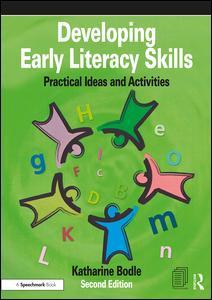Description
Developing Early Literacy Skills (2nd Ed.)
Practical Ideas and Activities
Author: Bodle Katharine
Language: English
Subject for Developing Early Literacy Skills:
Keywords
Resource Sheet; Language; Consonant Vowel Consonant Words; Literacy; Form Letter Shapes; Dyslexia; Child’s Blindfold; SLCN; Teddy Bear; Reading; Carpet Tile; Writing; Phonological Awareness; SLT; Alphabet Arc; Initial Letter Sound; Letter Shapes; Child’s Daily Routine; Important Life Skill; Feely Bag; Reading Pack; Alphabet Song; Picture Card; Twinkle Twinkle; Good Phonological Awareness; Alphabet Cards; Reading Checklist; Synthetic Phonics; End Board; Pencil Grip; Onset Rime Division; Nursery Rhymes
· 21x29.7 cm · Paperback
Description
/li>Contents
/li>Readership
/li>Biography
/li>
A valuable resource for professionals working with pre-school children, or with older children lacking basic literacy skills, this book provides practical photocopiable activities to develop the early skills required for success with literacy. Includes: rhyming activities; alphabet activities; phonological awareness; writing and handwriting; and reading. Each section is structured so that children can build up their knowledge and skills. Developed within the classroom, these ideas and activities can be used with a range of children in whole class, group and individual situations both at home and in pre-school settings. Designed to help children showing early signs of dyslexia or a specific learning difficulty, these activities will also benefit older children who lack a foundation of early literacy skills. This updated edition reflects changes in legislation, and includes refreshed word lists and new subject areas, such as visual perception, fine and gross motor skills. It is invaluable for teachers, learning support assistants, nursery workers, parents and carers.
Contents
Acknowledgements
Introduction
Key facts
How to use this manual
How to use the activities
Setting up teaching situations in school
Tips for working with children at home
Section 1: Basic skills
Section 2: Rhyming
Section 3: Learning the alphabet
Section 4: Phonological awareness
Section 5: Reading
Section 6: Writing and handwriting
Conclusion
Resources and suppliers
Useful organisations
Recommended Books for Young Children
References and Further Reading
Katharine Bodle is a freelance Dyslexia Consultant. She worked as a Beacon Teacher at a Dyslexia -friendly primary school where she helped to publish resource materials to aid mainstream teachers. She also featured in a Teachers TV documentary Teaching the Dyslexic Child. She has lectured on courses to train teachers to identify and teach Dyslexic learners and structured spelling courses as well as OCR Level 5 courses training Specialist Teachers in Specific Learning Difficulties. She delivers INSET training in schools on Dyslexia Friendly Classrooms and Continuous Cursive Handwriting and advises teachers on practical strategies to support children in a mainstream classroom. Currently she is the SENDCo at a primary school endeavouring to ensure that literacy and other learning difficulties are identified and remediated as early as possible.




